This section outlines 10 key principles for providing a successful pre application and PPA service. For each principle we explain why we think this is important, what we suggest you do and, where relevant, provide some best practice examples for you to follow.
Outlined below are the 10 key principles that we think you should follow to provide an excellent pre application service. For each principle we have set out examples of best practice from councils
A common theme that was consistently communicated through the research was that councils often either did not have enough staff to support the pre application / PPA service or there was a real shortage of staff who can manage the more complex pre application enquiries or lead on PPAs.
Why is this important?
Through a pre application an applicant is paying for planning officers and other specialists to provide expert advice that will de-risk a development proposal. If the quality and quantity of staff are not available at a council then the pre application service can never be effective
The case officer is the project manager for a pre application or PPA and needs the necessary support from colleagues and managers. If staff resources are limited then this support will not be available and the quality of the pre application or PPA advice will inevitably be impacted
Pre applications are only useful to an applicant if they are timely and meet the development timeframes of the applicant. If the council, by necessity, has to focus limited staff resources on planning applications applicants will simply not use the pre application service or enter into a PPA and negotiate through “the free go”
To achieve this we suggest you need to:
Sell the service not only to potential applicants but to your own senior management team so that the pre application and PPA service is given the support and priority that it deserves
Backfill posts so the best staff get the best work. To retain the best staff give those staff the most interesting work. You should aim to use agency staff only to backfill posts so that your most talented staff can develop their talents further through PPAs and complex pre applications
Use income to bring in technical specialisms and additional planners. A PPA can rarely be managed effectively through a Planning Officer carrying out the work on top of their other work. It normally needs a dedicated resource and clearly identified individuals who can provide the specialist advice
Sell yourselves as a proactive council to attract the best talent from the limited pool of Planning Officers available
Ringfence pre application and PPA income to the Planning service so that you can properly resource the service
As demonstrated in the fees review work the fees charged by councils for pre applications vary enormously across the country. Very few councils charge fees that meet their actual costs of providing the service. Many councils do not have an effective process in place that establishes an appropriate fee level that will pay for the council’s time in delivering the pre application service.
Why is this important?
There is no consistent charging methodology across the UK to help alleviate the current problem that councils are charging different prices for a very similar service.
Councils are often not meeting their discretionary income targets because they are under charging for their pre application service
If councils monitor cost recovery, they can ensure they are making the best use of the service.
To achieve this we suggest you need to:
Use the PAS guidance on setting pre application fees
Establish a genuine hourly rate that properly takes account of the cost of providing the service using the PAS guidance
Think very carefully when offering free services. Are you happy to subsidise the advice given?
Monitor and review your fees to ensure you are maximising the income that you can reasonably expect from applicants
Good examples to follow
The data on the 87 councils surveyed will help you identify fee schedules that most closely match councils most similar to you.
The lessons learnt from the fee schedule workshops will help you gather best practice for your fee schedule
Most councils advertise some level of pre application service and the opportunities to enter into PPAs, even if some councils have temporarily suspended the service due to resource constraints. However, most councils are poor at properly communicating to potential customers the value of the service and many merely set out the costs and the method for applying.
Why is this important?
This will help achieve the full benefits of front loading, making best use of officer time by limiting the negotiation period during the live planning application. It will also help you secure further income to enable you to provide the service and therefore increasing your resources.
It ensures that all interested parties in the planning application process understand and appreciate the importance and use of pre-application services and PPAs. In turn, this will encourage all those who have a role to play in pre-applications and PPAs to commit time and energy into the processes.
To achieve this we suggest you need to:
Include a section of the website dedicated to the benefits and signpost queries which can be used for officers and applicants alike.
Ensure the web text can be presented from different viewpoints. For instance, it could include information about how pre-application engagement can de-risk development projects to help persuade applicants to use the service. It could also provide an explanation of its potential to improve planning decision making which would be aimed at a wider audience.
Ensure that you clearly publicise the benefits of pre-application advice and PPAs via your website, within internal communications and to Councillors.
Some good examples to follow
Buckinghamshire Council has wording on its website that explains how applicants can get the best out of the pre-application service and outlines common mistakes made by applicants:
Buckinghamshire Council guidance
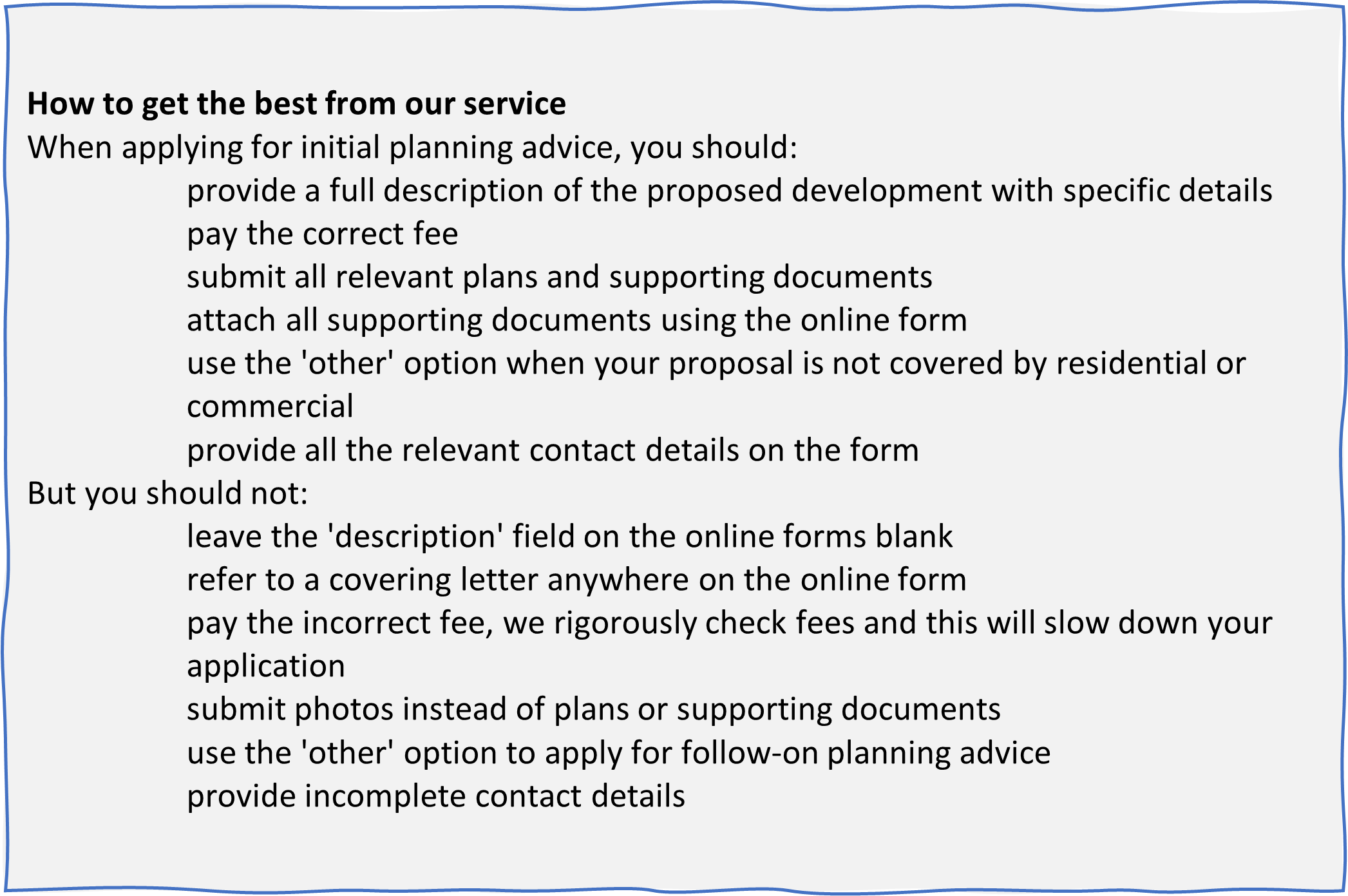
Plymouth City Council highlights the benefits in a comprehensive but digestible format within their fees policy, an example of which is shown below. This would be better displayed on the website in html to ensure it is accessible, but the content is very useful:
Plymouth City Council fees policy
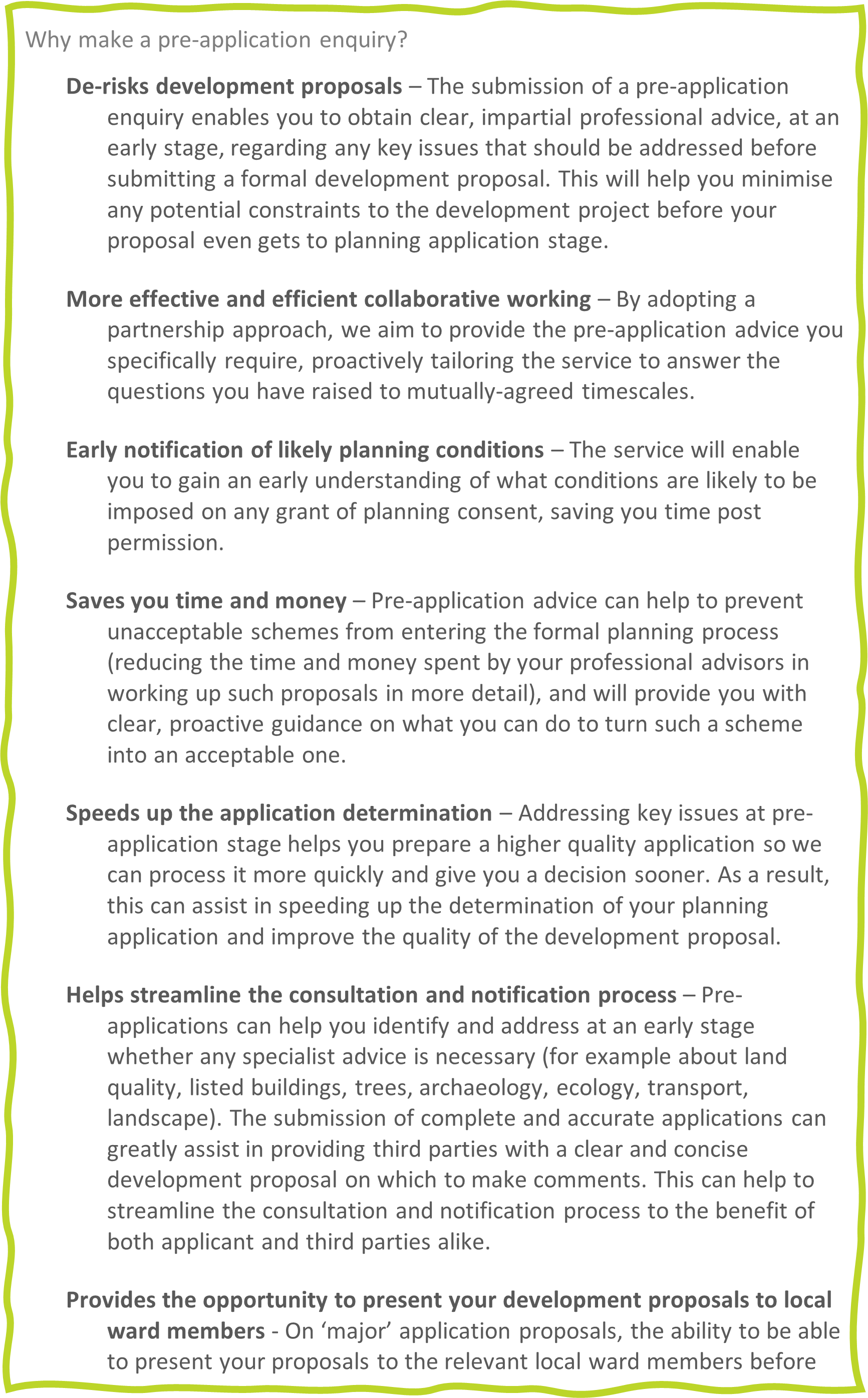
PPAs are now used by many councils as an opportunity for the applicant to engage in more detailed discussions with a council and to enable both sides to commit resources and timescales to the delivery of key development proposals. However, PPAs are often used as an alternative to a pre application rather than a tool to ensure that a commitment is given by all sides to ensure that an initial idea is actually delivered on the ground. If all sides commit to work together at the pre application stage this strength of partnership working can easily be continued past the planning application stage to post decision matters.
Why is this important?
PPAs can significantly improve the quality of development and places by ensuring there is a team approach to delivering development that meets the aspirations of all parties, not just the developer’s brief.
PPAs enable stronger working relationships to be built up between all the parties involved in delivering a development.
PPAs ensure that applicants have a dedicated resource throughout the planning process to help it to be delivered effectively.
PPAs are much more than just a project management tool, they can also help build relationships and allow for a better quality of development. They can be used as a comprehensive way of delivering a development proposal by ensuring there is a positive partnership between the applicant and the LPA from the conception of a development through to its construction.
To achieve this we suggest you need to:
Make use of the best practice framework that has been developed by PAS
There is an enormous variation to the way councils set out their pre application offer and it is often confusing and inconsistent. Councils will also sometimes set out a timeframe for a response, but will very often not meet these response targets because they are either unrealistic in the first instance or have to be changed due to pressures on officers to carry out their statutory duties. This gives a unprofessional impression of a council that does not explain its offer effectively or fails to meet its commitments.
Why is this important?
It ensures that your offer is deliverable, helps build trust between all parties involved and further encourages customers to take up the service.
It provides clarity to your customers on the service you provide and how much it costs. It helps to:
- manage expectations;
- encourage customers to take up that service; and
- reduce the number of customer queries about the service.
To achieve this we suggest you need to:
Be clear about your pre application charges and the service that you get for these charges. Further guidance can be found in the pre application fee calculator guide
Have clear customer expectations on the timescales for providing advice and the format that the advice will be provided. Will the applicant receive a written report, an email or verbal feedback? You may want to think about creating a standard template for officers to complete to ensure consistency of approach. More guidance on this is given in the setting and reviewing of pre application fees section
Consider the use of an interactive map on your website displaying relevant Development Plan policies, Neighbourhood Plans, design codes, Supplementary Planning Documents (SPD), constraints such as internationally protected habitat sites or areas of flood risk, and other useful information such as planning history. Some councils already have GIS layers for their policies and constraints, but do not make this openly available for the public. Having this information readily available, and advertised on the website, in an easy to use format will allow applicants to carry out their own research that prior to the formal pre application.
Some good examples to follow:
Basingstoke and Deane Borough Council include a detailed explanation on their website of the service they offer, how it is approached and accessed, and what is provided. They have a flow chart (see also below) which breaks down all the tasks into smaller chunks so applicants are fully aware of the mechanisms happening at each stage
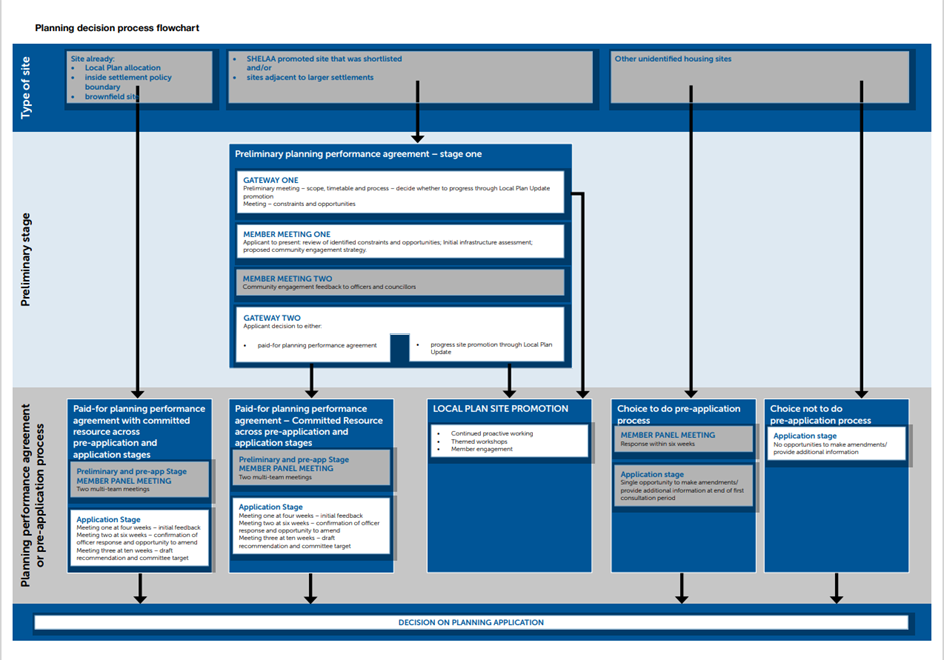
Basingstoke and Deane Borough Council also makes a series of commitments in relation to the provision of their pre-application service:
An alternative way of demonstrating a clear offer through the use of a leaflet, in paper and/or online formats, as Waltham Forest provides
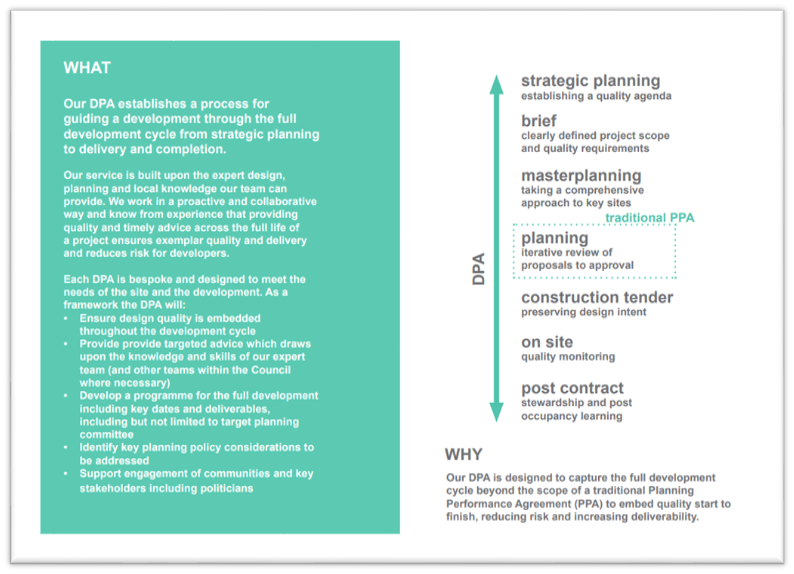
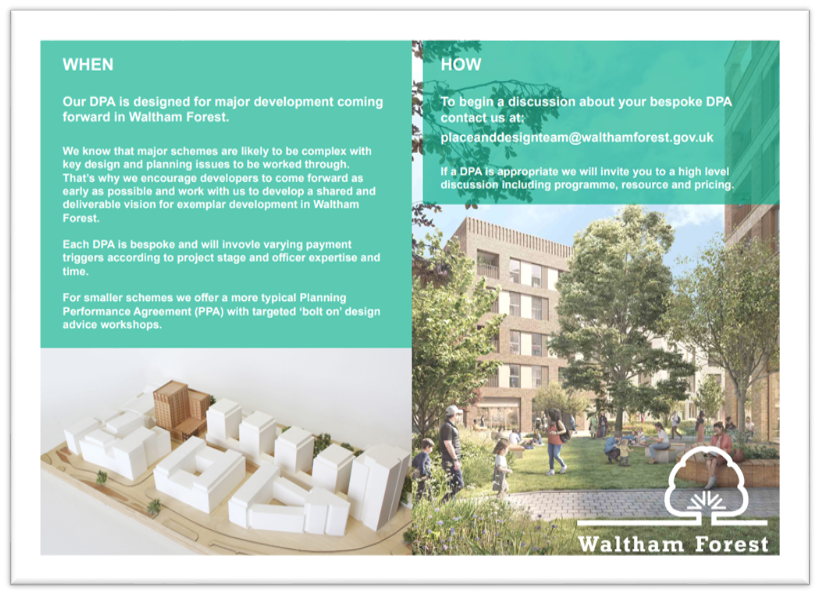
Basingstoke and Dean Council has developed a proforma for officers that contains a Red/Amber/Green (RAG) rating against different issues
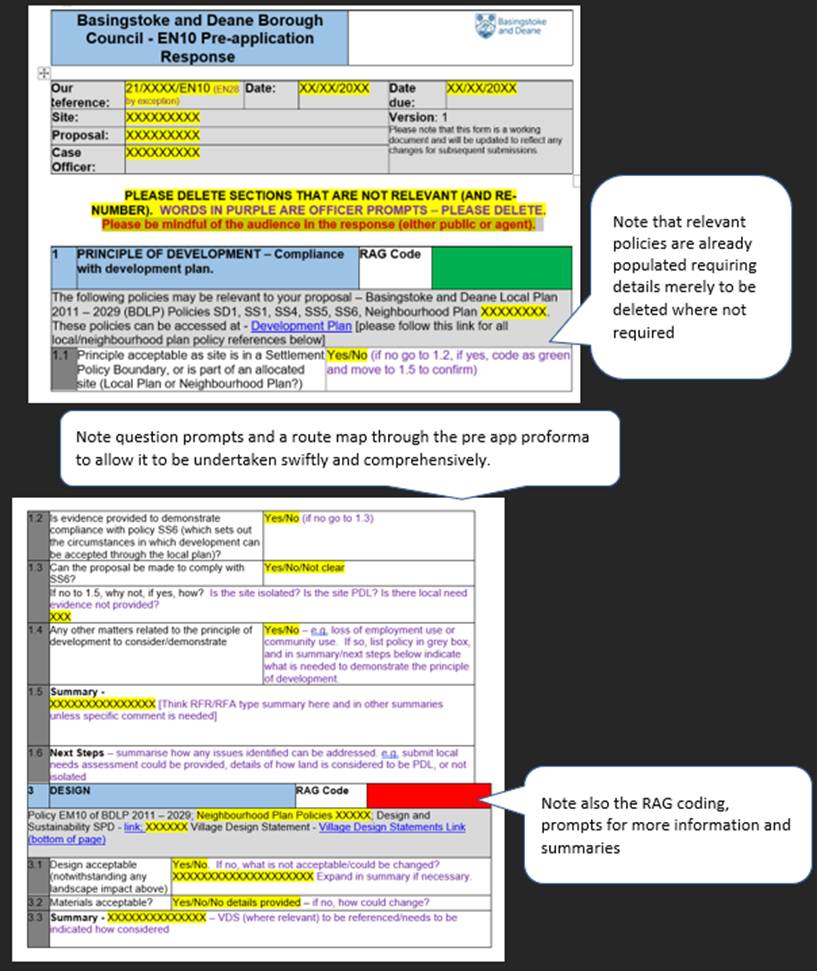
The form includes sections on a wide range of topic areas such as: natural environment; heritage; highways; residential amenity; flooding; local plan status etc.
The proforma was developed in consultation with local development agents / planning consultancies.
It gives clarity and certainty with regards to the information that will be provided through the response. The proforma ensures that in addition to identifying relevant policies, the officer provides some professional judgement. The RAG indicator is used to give clear understanding of areas in need of attention. It should be noted that for very large and complex schemes a bespoke approach is used. However, the proforma is used for the majority of cases to aid both consistency in response approach and the quality / effectiveness / impact of the response provided.
Some councils use an interactive mapping tool to help applicants carry out their own research on planning constraints. For example Lancaster City Council has a very helpful interactive mapping tool to help applicants identify heritage constraints.
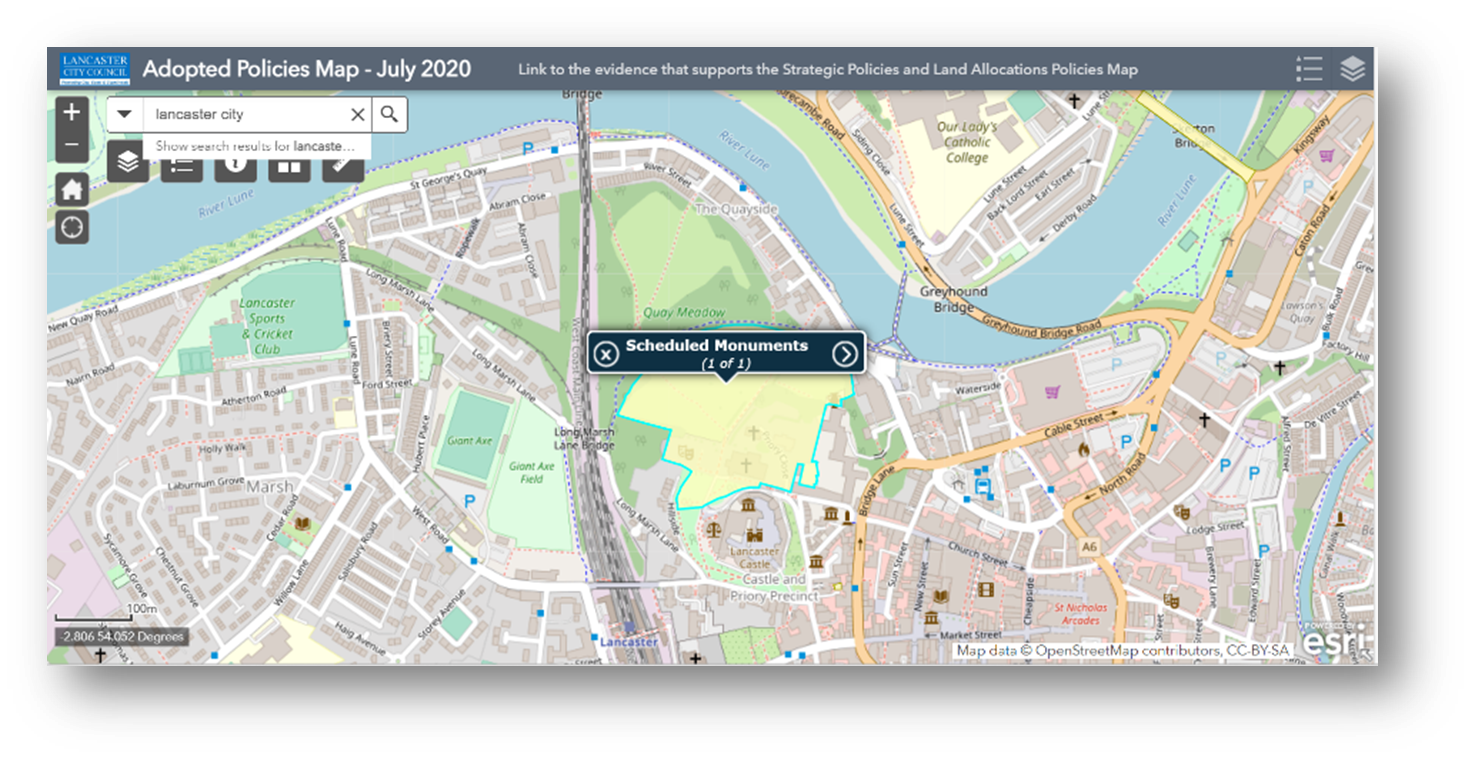
A pre application service is a discretionary service that a council provides for applicants. However, councils will often provide a very fixed, inflexible service that it considers may meet the operational requirements of the council concerned, but does not necessarily meet the requirements of the wider variety of customers who wish to use the service.
Why is this important?
A range of service offer that includes opportunities for face-to-face discussions improves working relationships.
Tailoring services to customers’ needs reduces time spent on activities that are not needed.
Providing customers with a range of services that suits their needs may encourage greater take up of the service.
To achieve this we suggest you need to:
Spend time talking to your customers to understand what services they need to ensure that the pre application discussions are meaningful and result in improved planning application submissions
Review and monitor your pre application service on a regular basis using the guidance provided by PAS
Some good examples to follow
The Planning Officers’ Society guidance relates different stages of pre app advice to RIBA work stages to help better structure negotiations:
RIBA work stages as set out in the Planning Officers Society guidance for pre-apps
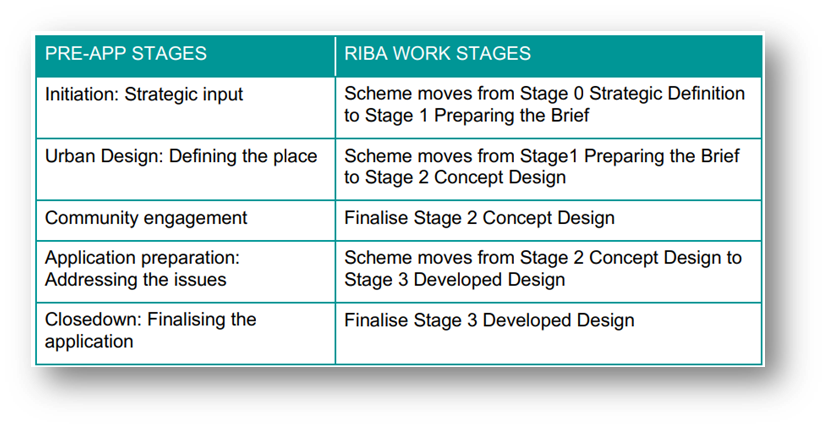
Salford City Council offers different advice based on the scale of the development
Salford City Council’s categories of pre-application planning advice [extracts].

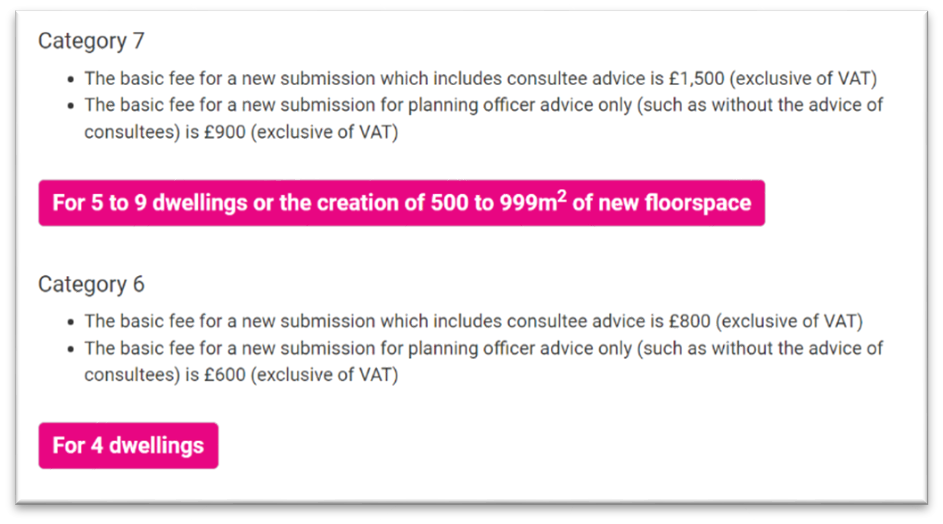
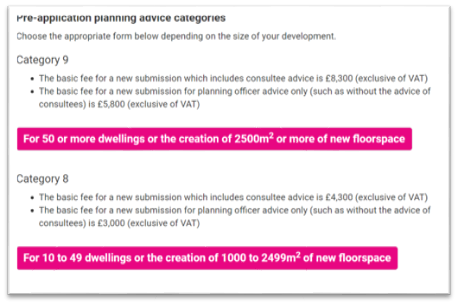
In comparison, Nottinghamshire County Council offers an informal and a formal pre-application service. The informal service is a one-off fee for a meeting of up to an hour long. This could help satisfy those instances where applicants want a quick understanding of the principle of development rather than paying for any in-depth guidance. If this were used, it is important that you ensure that case officers understand the reason for the ‘quick’ service and are supported in being strict about the time they spend on such applications.
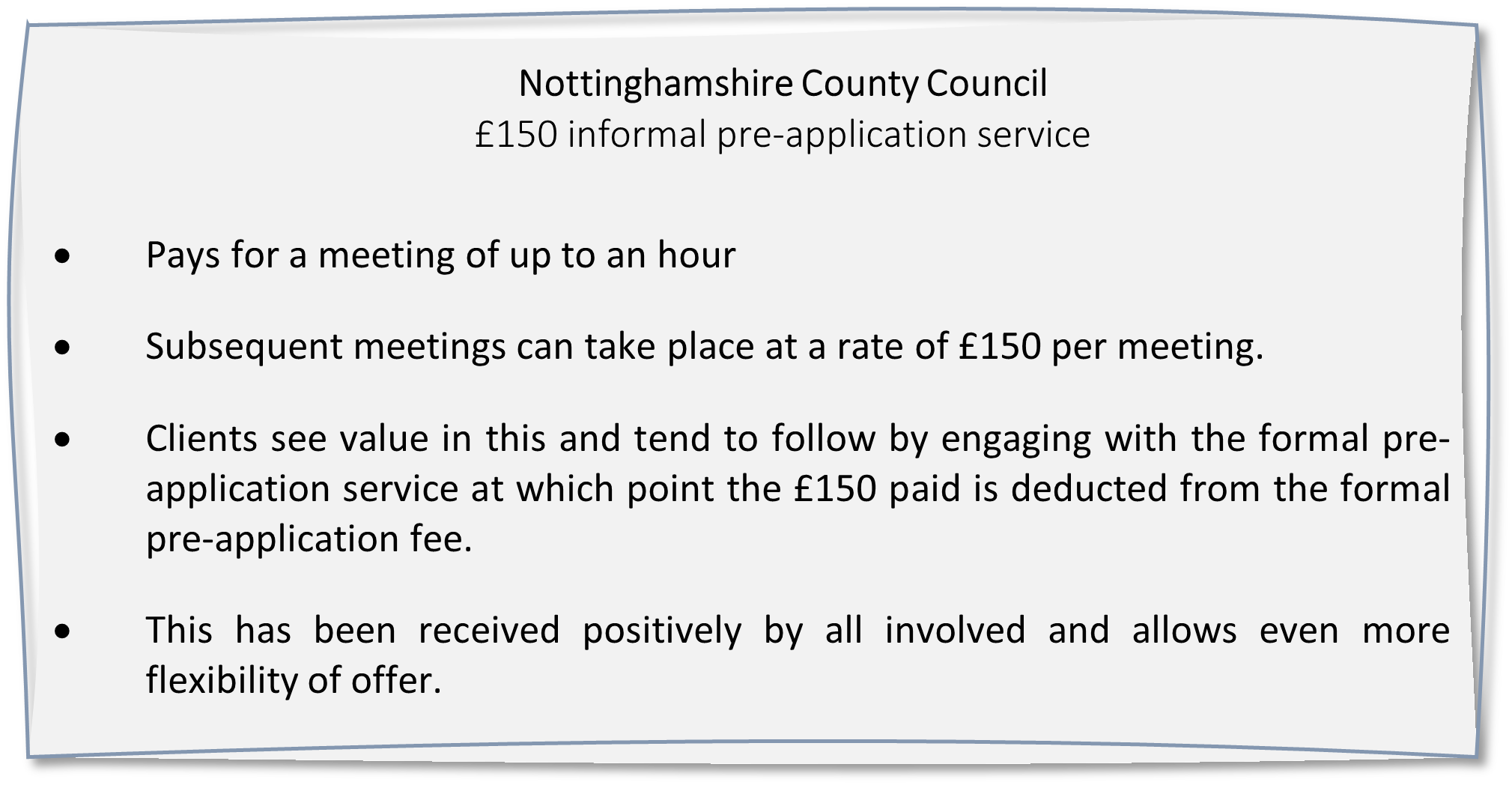
Dorset Council provides a service where the applicant can choose what ‘level’ of pre-application they require based on the time spent by an officer on the advice. The cost is linked to the size of the proposal. The extract below shows a screenshot of the website relating to householder pre-application advice compared to the charging schedule for pre-application advice for major development. In this case, three different levels of advice are given: written advice; one officer meeting including a write up of discussions; and one site-based meeting including a write up of discussions. The website is simple and clear on what the service is, how much it costs and what to expect from the LPA.
Extract of Dorset Council’s flexible offer
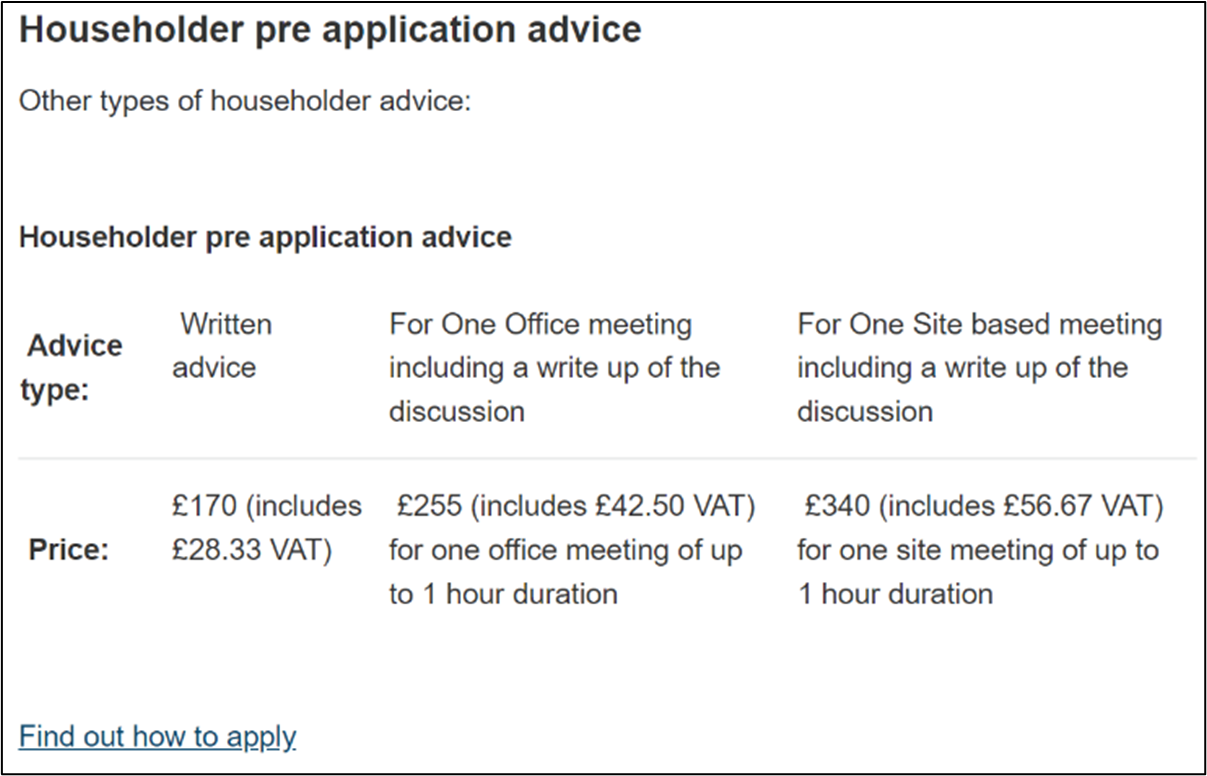
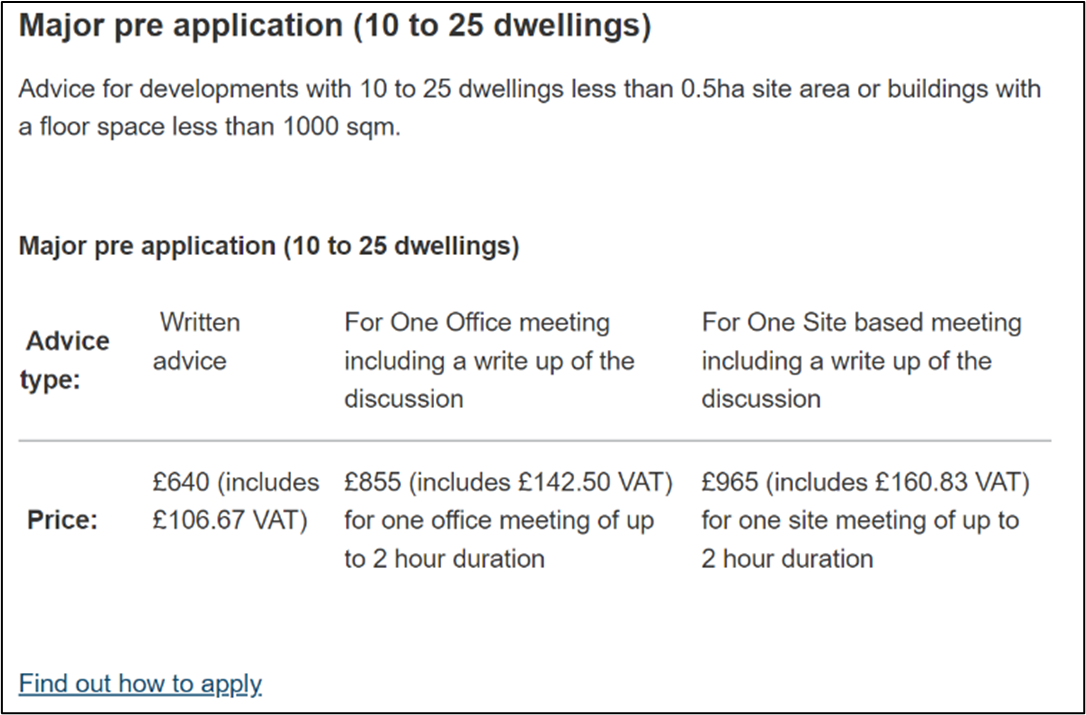
As part of a pre application discussion there is no necessity to consult statutory consultees as these consultees are only required to be consulted during the formal planning application stage. However, it is extremely useful for an applicant to understand at the pre application stage the views of consultees so that they can address these views prior to the formal planning application stage. Some statutory consultees will either only engage at the formal planning application stage or charge applicants separately for pre application advice.
Why is this important?
The research found instances and heard from respondents about statutory consultees running their own pre-application services. Whilst this was helpful to generate a response, concern was expressed from LPAs and applicants about the lack of a joined up and holistic approach to considering development.
Greater collaboration will lead to improved working relationships between the LPA, the applicant and the statutory consultee.
Greater involvement in pre-application advice can lead to better proposals, reduce the need to ask for more information or revisions and better outcomes.
There is concern that a lack of resourcing for statutory stakeholders, particularly County Council Highway teams, is leading to delays on major applications. Encouraging statutory stakeholders to sign up to a pre application or PPA will help them better plan their resources and secure additional resources. They could also use this as an opportunity to fund additional resource.
To achieve this we suggest you need to:
Involve consultees in the monitoring and review of your pre application service so discussions can take place on how to improve consultee engagement
Incorporate consultees as part of your fee schedule and ensure that the service works for them
Consider Service Level Agreements with key statutory consultees or with the County Council if you work in a two tier authority. In this way the consultees will be able to plan properly for the resources they need to provide the pre application service
Work with your neighbours to ensure consistency of approach across councils and ensure that the statutory consultees understand the likely demands from each council
Ensure consultees sign up at the commencement of a PPA so they own the commitment and can properly plan for the resource needed. If expected commitment is not achievable then the applicant will need to understand this upfront
Some good examples to follow
Consider providing a joined-up approach where stakeholders fees are incorporated into the overall fee for the pre-application / PPA as shown in Cornwall Council’s offer
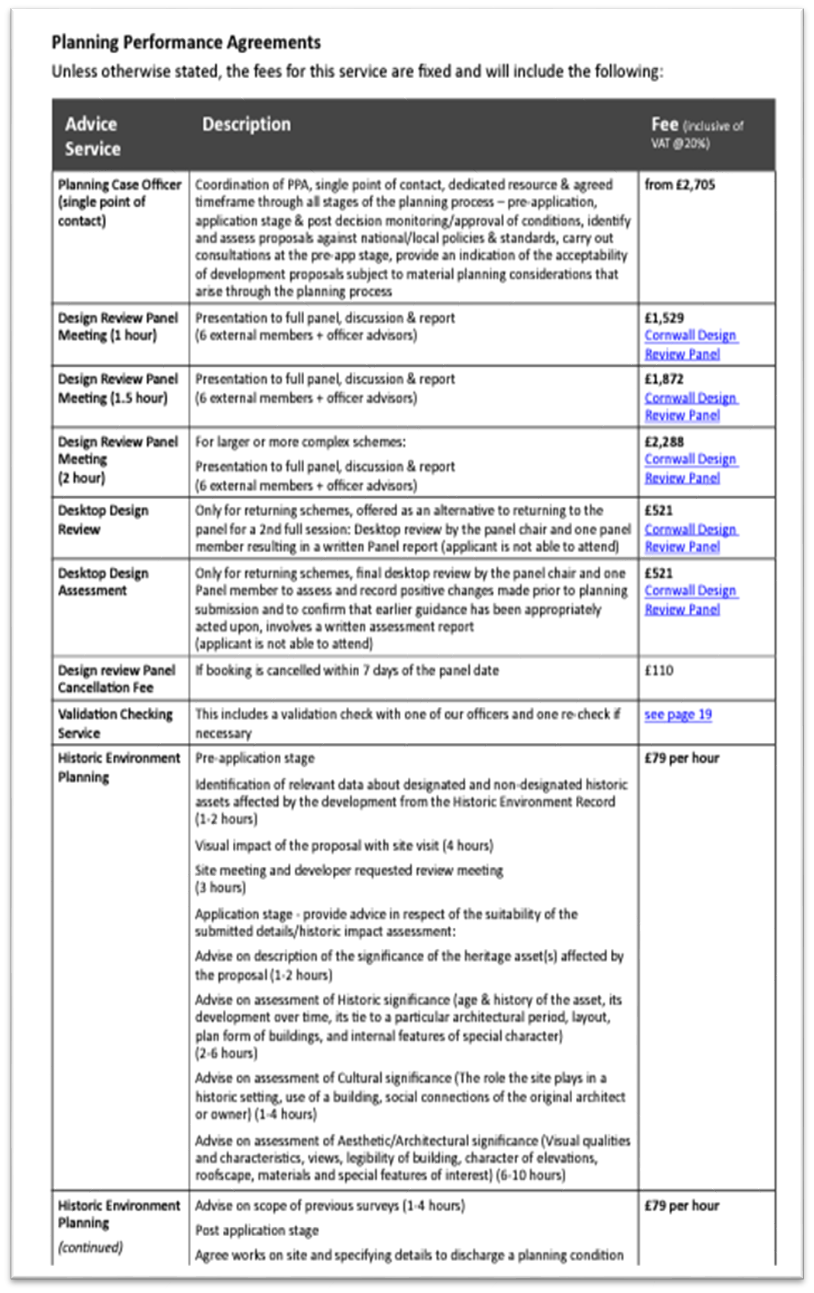
Alternatively, if a “one-team” approach cannot be achieved with the statutory stakeholder then encourage them to share their responses with you as LPA as seen in the example from Basingstoke and Deane and Hampshire Councils. It is important all the right agencies come together at the right time to build the full picture for the case officer to provide a comprehensive advice.
Our research found that councillor and community engagement varied enormously between councils. Some councils actively encouraged early community engagement while others consciously avoided community engagement until a planning application was submitted. In the councillor survey carried out as part of the research only 56% councillors were involved in pre application discussions, but 86% thought that they should be involved in these discussions.
Why is this important?
It is likely to result in reduced abortive work for applicants because applicants will not have to wait until the statutory consultation stage of a planning application to understand local feelings about a development
The local community can improve schemes that respond to the local circumstances.
If the community is asked at pre application stage then applicants have a greater awareness of the views of the community and councillors.
Early involvement is likely to improve relationships between applicants, the LPA and the community.
If the community can play a role early in the process of decision making it can potentially increase levels of satisfaction with the planning process.
Involvement will result in a greater understanding of the planning process from the community and councillors.
Increased involvement and influence in the planning process from the community and councillors can result in greater buy – in by the community to the ideas being put forward
To achieve this we suggest you need to:
Ensure it is clear what approach is taken by your council on councillor and wider community engagement and that this is set down if relevant through codes of good practice, on the website etc
Ensure councillors are trained on the council’s approach to pre applications so that they can in turn ensure that the community understands when and how they can influence decision making
Discuss community engagement at agents’ / developer forums so that the applicants understand when the community will be involved and the council can properly incorporate the views of the development community on community engagement
Incorporate pre applications as part of regular discussions with the Chair of Planning Committee / Portfolio Holder so that there is a clear understanding of the approach that will be taken on discussions that have a strong public interest
Good examples to follow
Some councils choose to encourage the applicant to undertake community engagement at the end of the pre-application process prior to submission of the application. For example, below is an extract of a council’s response letter encouraging applicants to engage with local communities and their representatives.
Extract of pre-application response letter
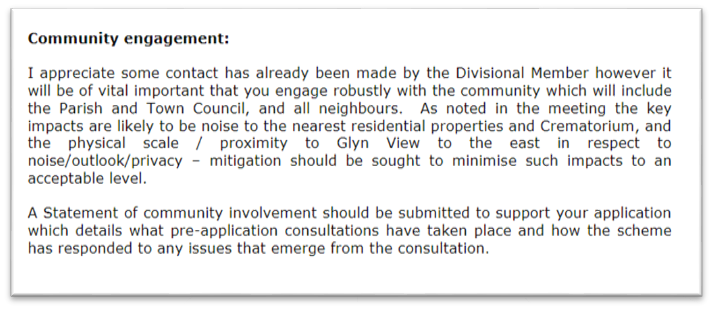
Others are more pro-active and involve Councillors during the pre-application stage.
Lancaster City Council’s pre-application offer gives the ability for applicants to seek views of Councillor and local community representatives in a structured way. Also below is a presentation by Lancaster City Council on its approach to community engagement in pre applications.
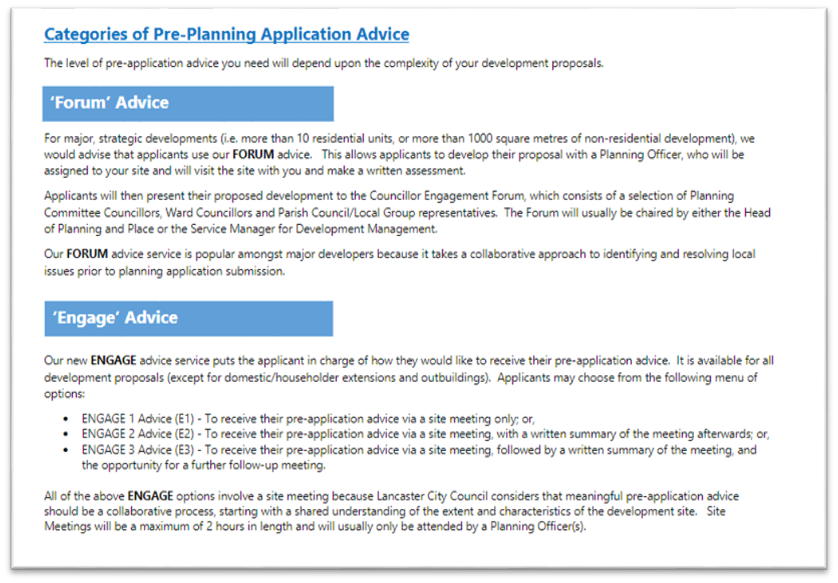
Lancaster City Council presentation (PAS training event 13th March 2023)
In another example, Greater Cambridge (a shared service provision between South Cambridgeshire District Council and Cambridge City Council LPAs), have developer led briefings before an application is submitted. Some councils do this via a special meeting, some undertake this type of briefing prior to or after Planning Committee.
Charnwood Council includes information on the pre application request form on confidentiality and Freedom of Information.
Extract from Charnwood Council Pre-application request form
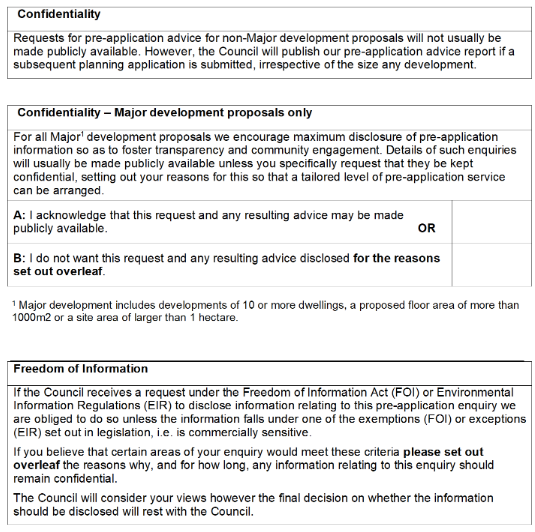
One of the key skills that are needed to run a successful pre application or PPA process is project management skills. PPAs in particular require the ability to manage complex tasks involving a number of individuals, large amounts of information and clearly defined timescales. Individuals need a high level of project management skills to be able to deliver what is required of them.
Why is this important?
The planning process is complex involving a wide range of customers and stakeholders. Major planning applications in particular need careful management to ensure that all the material planning considerations are properly addressed and a decision is made in a timely manner
Project management skills should be a key part of a Planning Officer’s skills. However, our research indicates that these skills are very often lacking and this is causing frustration from the applicant and can de-rail the success of the service that the council is offering
PPAs in particular involve an agreement between the applicant and the council to deliver outcomes against a pre agreed set of targets. This involves being able to manage multiple, inter dependent tasks to agreed performance targets
To achieve this we suggest you need to:
Support staff to attend training in project management skills. This doesn’t have to be a formal project management qualification (such as PRINCE2) but key project management skills that are bespoke to the Planning profession that could be offered by professional planning bodies such as the RTPI
Encourage your team to learn from others who have a good track record of successfully project managing pre applications / PPAs. This could be by shadowing those who do it well in your organisation or sharing best practice with other councils.
Encourage your University Planning Schools to train students in project management skills appropriate to planning
Very few councils regularly monitor the value of pre applications or regular review the effectiveness of the offer that is provided. Therefore, it is very difficult for councils to sell the value of the service to potential customers or to make changes to their offer to enable better outcomes from the pre application service that is provided. However, when councils do reflect on the service that they offer it is inevitably appreciated by applicants and ultimately improves the service that is offered in the longer term.
Why is this important?
Monitoring the outcomes of the service, will make the case for offering the service.
It will assist in comparing the time taken and quality of proposal with applications which did not use the service.
Understanding actual time spent assists resource planning.
By monitoring the time spent on delivering pre-application services it will provide LPAs with a better understanding of the actual time spent and costs incurred, helping the service and pricing to be refined accordingly.
To achieve this we suggest you need to:
Ask yourself and your customers some key questions to ensure you can make the necessary changes to improve the service you offer. These include:
- Did you reach your income target? If not, why not?
- Are you providing advice for free when you could be charging for it? Does it make sense to charge?
- Is it working? You could review a selection of pre applications and the end result of the application. Did the pre application result in a better development and / or an easier transition through planning application? If not, what happened?
- Are you meeting your quality targets and are customers satisfied with the service being offered. If not, why not and what are you going to do to either improve the quality or lower expectations?
- Which pre application services were most used and were any not used at all? If they were not used why not?
- Was there any feedback on the charge made? Does that fee need reviewing?
- Was there any ambiguity in any of the charges made? Did officers or applicants interpret the description of the service in different ways? (For example, are you clear that a charge based on housing numbers means gross or net increase in overall numbers?)
- Is there a service being requested that you are currently not offering? Do you want to offer that service?
It is also a good idea to not only ask applicants about the impact of the pre application service, but also to discuss with the wider community on how well engaged they feel as part of the pre application process. As part of the councillor survey (survey undertaken by PAS November 2022) that formed part of this project only 21% of councillors were aware of any review process carried out by their council and 67% did not know whether their council carried out a review of impacts. However, 86% of councillors felt that councillors should be involved in the pre application process with their officers
Some good examples to follow
Two councils who carry out effective monitoring and review of their pre application service are Central Bedfordshire Council and Salford City Council. Attached are two presentations that explain the way these councils carry out effective monitoring and review.
Central Bedfordshire presentation (PAS training event 14th March 2023)
Salford City Council presentation (PAS training event 14th March 2023)
